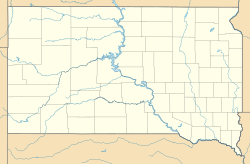Germantown Township Bridge S-29 facts for kids
Quick facts for kids |
|
|
Germantown Township Bridge S-29
|
|
| Nearest city | Chancellor, South Dakota |
|---|---|
| Area | less than one acre |
| Built | 1942 |
| Built by | Turner County Highway Department; Works Progress Administration |
| Architectural style | Stone arch |
| MPS | Stone Arch Culverts in Turner County, South Dakota MPS |
| NRHP reference No. | 00001219 |
| Added to NRHP | October 30, 2000 |
The Germantown Township Bridge S-29 is a special old stone bridge in Turner County, South Dakota. It crosses a small stream on 278th Street, not far from Chancellor. This bridge was built in 1942, and it's one of the few bridges left from a time when the government helped people find jobs during a tough period called the New Deal. Because it's so important, it was added to the National Register of Historic Places in 2000.
About the Germantown Bridge
The Germantown Township Bridge is found in the countryside of southeastern Turner County. It's about 1.5 miles (2.4 km) southwest of Chancellor. The bridge carries 278th Street, a paved road, over a small stream.
How the Bridge Looks
This bridge has two stone arches. Each arch is about 7 feet (2.1 meters) long and 3.5 feet (1.1 meters) high. A stone wall, called a headwall, rises above the arches on both sides. It's about 10 inches (25 cm) higher than the road.
The headwall also has angled "wing walls" that extend out. On one side, there's a stone "nose" that sticks out from the arches. The bridge is built from strong local stone called quartzite and granite fieldstone. These stones are held together with a lot of mortar.
Building Bridges During the New Deal
This bridge is one of 180 stone arch bridges built in Turner County. They were all part of a federal program during the New Deal era. The New Deal was a time in the 1930s and 1940s when the United States government created programs to help people find work during the Great Depression.
Turner County was able to build these stone bridges for less money than the usual steel bridges. This was because many skilled stone workers were available. Also, the government helped pay their wages. The county was in charge of managing the work crews and providing all the building materials. This particular bridge was built in 1942 by a county crew, following a standard design from the state.



